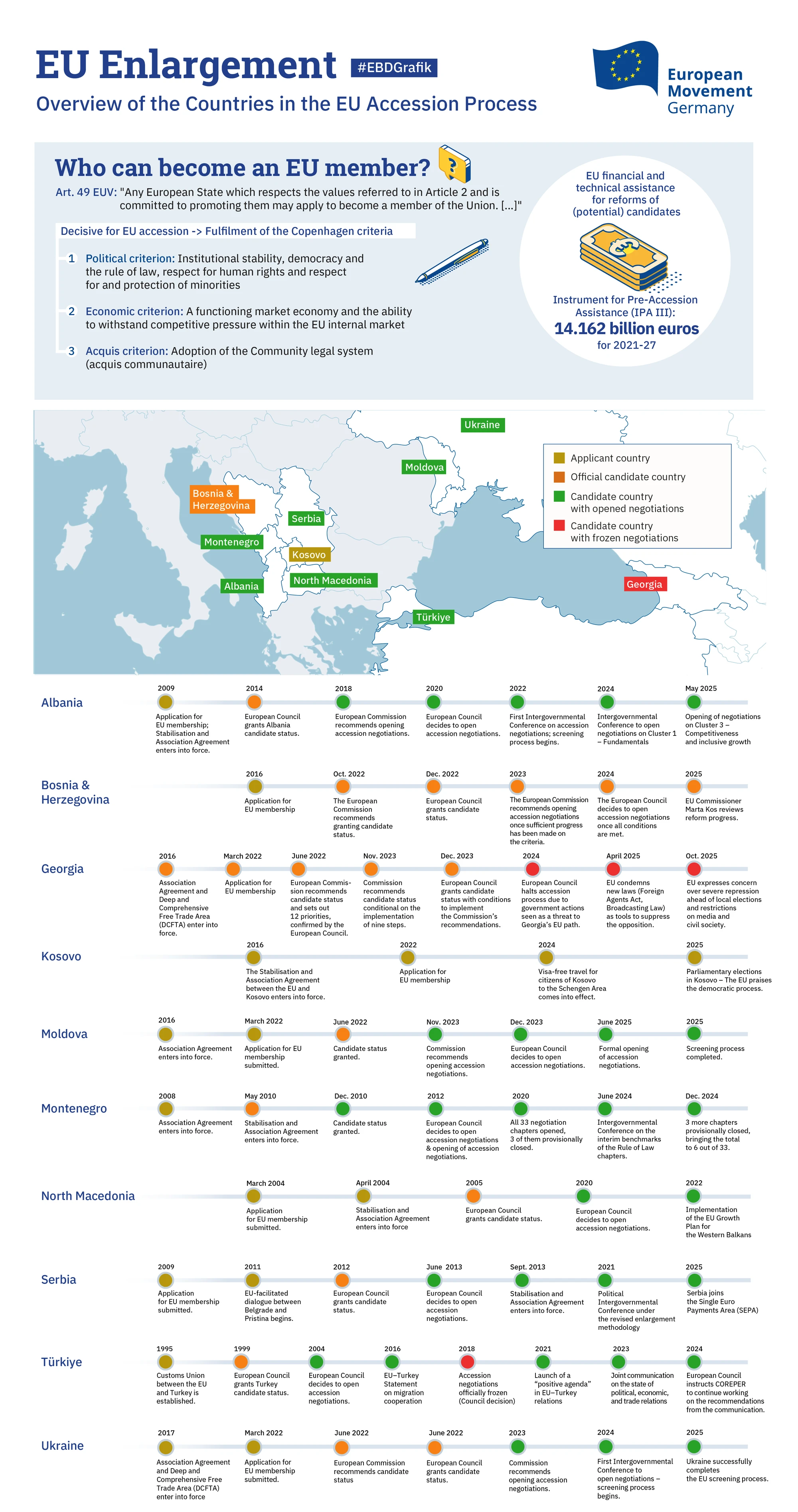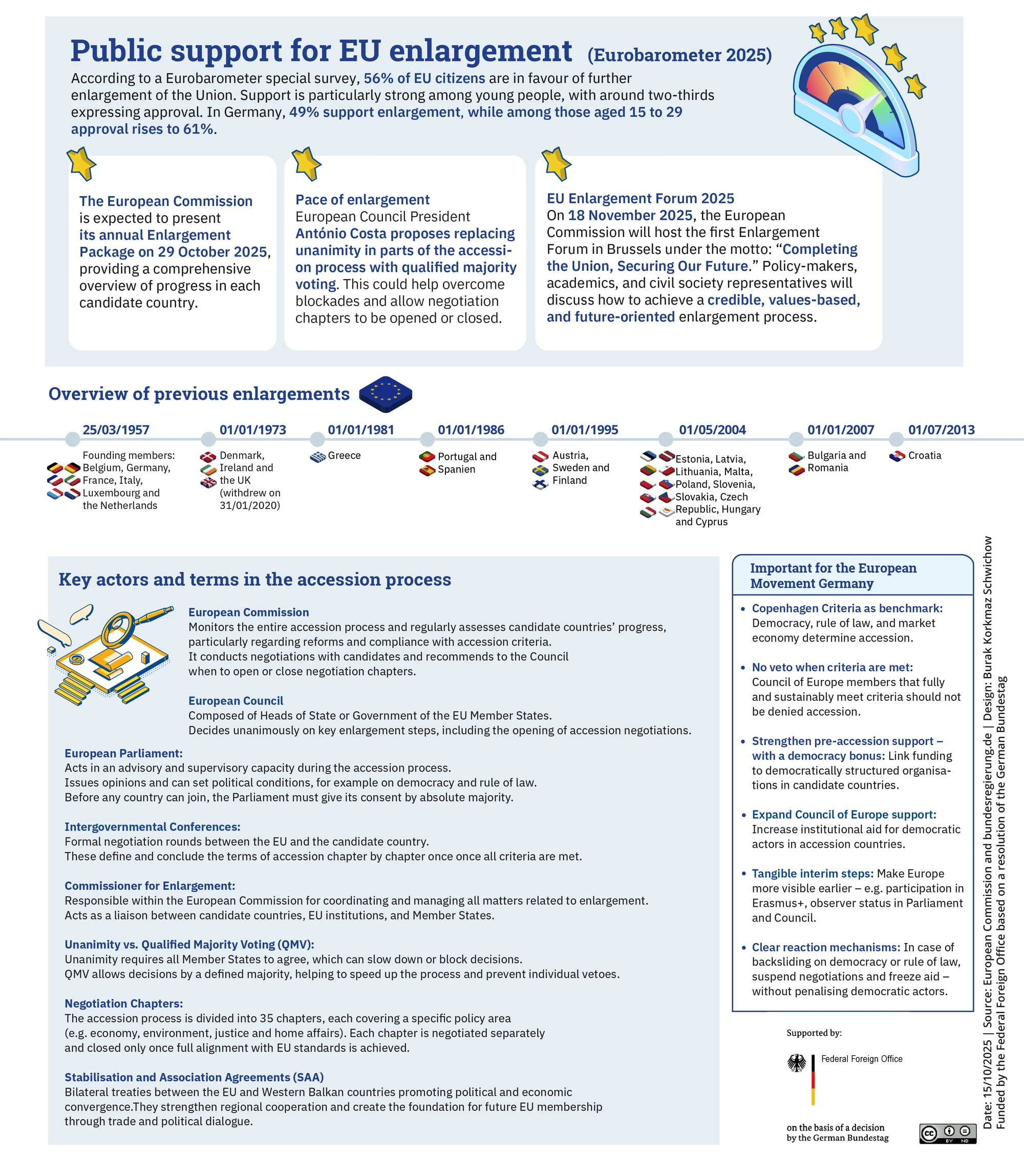EM Germany Newsletter October 2025 | EU enlargement as a key to peace and stability in Europe
Dear readers,
"The free Europe is strong enough to fend off attacks from within and without – but too weak to strengthen itself.” This warning is being voiced more and more often. EU enlargement is one of the “hot topics” in current European politics – surpassed only by the equally urgent need to reform the Union itself, for instance by introducing majority voting in the Common Foreign and Security Policy.
Enlargement and deepening are not ends in themselves. They are crucial for peace, freedom, and stability on our continent. Yes, democratic shortcomings exist even within several EU Member States – some of which have been part of the Union for over a decade. Yet democratic and rule-of-law structures are under pressure not only inside the EU, but even more so beyond its borders. EU membership presupposes compliance with the Copenhagen criteria: democracy, rule of law, and a functioning market economy. From this arises a responsibility towards people: democrats across this continent must stand together and support one another. Let us imagine for a moment: where would the Russian army stand today if the Baltic States were not members of the EU and NATO? And how much more endangered would democracy be in Hungary or Bulgaria without European integration?
Strengthening a democratic and free Europe requires discipline – both in dealing with external attacks and in confronting internal erosion. But it is also essential to remain capable of joint action in times of growing transatlantic uncertainty.
When the European Commission presents its Enlargement Package on 29 October, the discussion will not only concern the famous “homework” of the ten applicant and candidate countries. Our #EBDGraphic provides an up-to-date overview. Yet it is also about a serious debate: how can the EU allow majority decisions already during the ongoing accession process and create tangible interim steps along the long road to membership? And how seriously are we addressing our own reform tasks within the Union?
In many candidate countries, people are taking to the streets against corruption and authoritarian arbitrariness. In Moldova, the election results speak a positive language. In Serbia and Türkiye, however, disappointment is growing – democrats feel that the EU is not taking them seriously enough. In this issue, Dragana Đurica shares insights from the European Movement in Serbia. The recent protests reflect a deep social polarisation – between a government-aligned, partly pro-Russian camp and a pro-European opposition that, regrettably, remains fragmented. Today, Russia is working to question and undermine the very values on which both the Council of Europe and the European Union are founded – democracy, rule of law, and human rights. This makes our mission for a strong Europe all the clearer.
Because precisely now, it is crucial that free Europe is not only strong enough to fend off attacks from within and without – but also strong enough to renew and reinforce itself from within.
With european regards
Bernd Hüttemann
Secretary General of the European Movement Germany
#EBDGrafik of the month


The enlargement of the European Union is back on the political agenda. Progress in Ukraine, Moldova and the Western Balkans contrasts with setbacks in Georgia and sparks debate on how to avoid decision-making deadlocks in the future.
Our current #EBDGrafik of the Month illustrates which countries are on their path to EU membership, which reform steps will be decisive in 2025, and why the upcoming EU Enlargement Package (29 October) and the first EU Enlargement Forum (18 November) will be key milestones for Europe’s future. | Our #EBDGrafik is available for download here
EM Germany News
BDI European Affairs Roundtable – The Multiannual Financial Framework Under Pressure |
How can the EU budget withstand future crises and growing global competition? This question was at the centre of the European Affairs Roundtable hosted by our member organisation, the Federation of German Industries (BDI). EM Germany Secretary-General Bernd Hüttemann joined representatives of the BDI and other experts to discuss the future of the Multiannual Financial Framework (MFF) from 2028 onwards.
The Russian war of aggression, increasing investment demands and shifting geopolitical dynamics are heightening the need for an effective and solidarity-based EU budget. The European Movement Germany (EBD) welcomes the publication of the European Commission’s first MFF package and calls for a strong, forward-looking and democratically legitimate budget for Europe. | Learn more about the EM Germany priority “EUbudget” (in German).
Marie von Manteuffel nominated for the 2025 German Engagement Award | Great news from the EM Germany: Marie von Manteuffel, Woman of Europe 2025, has been nominated for the Audience Award of the German Engagement Award!
Through her tireless commitment to humane refugee policies, human rights, and European values, she sets a strong example of civic engagement and solidarity in Europe. Her nomination recognises her contribution on a national level – and offers the opportunity to give her work even greater visibility. Vote now until 26 October. Voluntary commitment deserves recognition – we’re keeping our fingers crossed!
Dialogue on European Coordination – EM Germany meets Minister of State for Europe Gunther Krichbaum | On 10th October 2025, EM Germany President Dr Anna-Maija Mertens and Secretary-General Bernd Hüttemann met with Minister of State for Europe Gunther Krichbaum at the Federal Foreign Office to exchange views on current European policy developments and perspectives.
The aim of the meeting was to strengthen Europe’s capacity to act and advance democratic processes through more connected European coordination. At its heart was the shared commitment to bring Europe together wherever freedom and democracy come under pressure – through cooperation, dialogue and shared responsibility. | Read more (in German)
EP Rapporteur in Dialogue – René Repasi on the “28th Regime” as a Way to Strengthen the EU Single Market | How can Europe strengthen its Single Market without creating new bureaucracy? This question was at the centre of a discussion held on 6th October 2025 at the European House Berlin, where MEP Prof. Dr René Repasi (S&D, SPD) presented the European Parliament’s initiative report on the so-called “28th Regime.”
The model aims to establish an optional European legal framework to facilitate business creation and foster the digital Single Market. During the discussion, moderated by Bernd Hüttemann (EBD), participants agreed that only a balanced approach combining legal certainty, social responsibility and effective oversight can gain broad support.
For the European Movement Germany (EBD), the initiative stands as a clear example of integration through law – less bureaucracy, more competitiveness and a more capable Europe. | Read more (in German)

EBD De-Briefing on Competitiveness – Industry, Innovation and Research in the European Focus | On 1st October 2025, the European Movement Germany (EBD) offered its network the opportunity to exchange views with the ministries responsible for the EU Competitiveness Council. In a digital discussion with Susanne Szech-Koundouros (Federal Ministry for Economic Affairs and Energy) and André Wecker (Federal Ministry of Education, Research, Technology and Space), participants discussed the key conclusions of the Council meeting held on 29th and 30rd September.
The debate focused on the European Competitiveness Fund (ECF), the Startup and Scale-up Strategy, the promotion of biotechnology and life sciences, and approaches to cutting red tape and simplifying regulatory processes. Moderated by Bernd Hüttemann (EBD), the exchange underlined that Europe’s economic strength depends on coordination, investment and clear rules – and on a Single Market that enables innovation rather than hinders it. | Read more (in German)
EBD De-Briefing AGRIFISH – CAP Budget and International Trade Issues in Focus | Europe’s agricultural and fisheries policy is facing crucial decisions. During the EBD De-Briefing AGRIFISH, EBD members exchanged views with Dr. Andreas Flach (Federal Ministry for Agriculture, Food and Rural Affairs) on the outcomes of the Agriculture and Fisheries Council.
Discussions centred on the future direction of the Common Agricultural Policy (CAP), the CAP budget in the next Multiannual Financial Framework (MFF), and current trade issues with the United States, Ukraine and the Republic of Moldova. The Mercosur negotiations, new plant protection rules and the postponed application of the EU Deforestation Regulation (EUDR) were also addressed.
Moderated by Fabian Häring (EBD), the exchange placed the agricultural and trade policy developments in a European context – with an eye towards the October Council, where the “green architecture” of the CAP will take centre stage. | Read more (in german)
Nachgefragt bei...

In our “Nachgefragt bei…” series, European voices regularly share their perspectives in short interviews.
In light of the ongoing protests in Serbia, the tense political situation and the debate on the country’s European course, we spoke with Dragana Đurica, Secretary-General of the European Movement in Serbia and Board Member of the European Movement International, about the current developments in Serbia, the role of the EU and the prospects for the country’s European integration process.
Ms Đurica, Serbia has been experiencing ongoing protests against the government. What are the main reasons behind these demonstrations, and who is driving them?
Dragana Đurica: Protests reflect deep and long-accumulating frustration with erosion of democratic institutions, media capture, corruption, and absence of accountability in public life. Collapse of newly renovated Novi Sad train-station canopy on 1 November 2024 became a breaking point, seen as a microcosm of corrupt system, and galvanized students-led protests that still continue nationwide and are joined by professors, professional associations, citizens, and local communities. Protests transcend party lines; they are not about ideology but about restoring normality, responsibility, and public trust. One tragic event revealed a state-captured system that has concentrated power while weakening democracy, and citizens are no longer willing to accept it.
Upcoming events
27th October 2025 | EM Germany European Council De-Briefing | Following the successful launch last July, the EM Germany European Council De-Briefing will take place as a face-to-face event for the first time on 27th October 2025. The focus will be on the results of the Council meeting on 23rd and 24th October. Ole Funke, Head of Group 52 at the Federal Chancellor's office, will present and contextualize the key decisions. | Further information (in German)
17th November 2025 | EM Germany Debriefing ECOFIN | On Monday, 17th November 2025, the EM Germany Debriefing ECOFIN will take place, focusing on the results of the ECOFIN meeting on 13th and 14th November. Ines Schlotter, Head of Division EB1 at the Federal Ministry of Finance, will present and summarize the key decisions. | Further information (in German)
17th November 2025 | EBD Briefing on the Moldovan Chairmanship of the Committee of Ministers of the Council of Europe | From mid-November 2025 to May 2026, the Republic of Moldova will hold the Chairmanship of the Committee of Ministers of the Council of Europe.
The chairmanship comes at a crucial time for the country: recent parliamentary elections have produced a pro-European majority, giving fresh momentum to Moldova’s EU accession process. At the same time, the regional security situation remains tense due to the ongoing threat posed by Russia.
The briefing takes place within the framework of the EM Germany cooperation project with the Council of Europe’s Directorate of Communications (more about the project). It will provide an opportunity to discuss the priorities of the Moldovan Chairmanship in the context of the country’s current political and security challenges. | Further information to follow.
18th November 2025 | EBD Cooperation Event with the European Commission Representation in Germany: The Future of Women’s Rights in Europe – Expectations for the New EU Gender Equality Strategy 2026–2030 | On the evening of 18th November 2025, representatives from politics, business and civil society will discuss the European Commission’s gender equality policy. The debate will focus on the political priorities the EU should set for the coming years – and on Germany’s role in shaping the new EU Gender Equality Strategy 2026–2030. | Further information to follow.
Check out former editions of our newsletter here.
Please sign up here if you would like to receive the newsletter (in German).
Zur deutschen Version dieses Newsletters.



